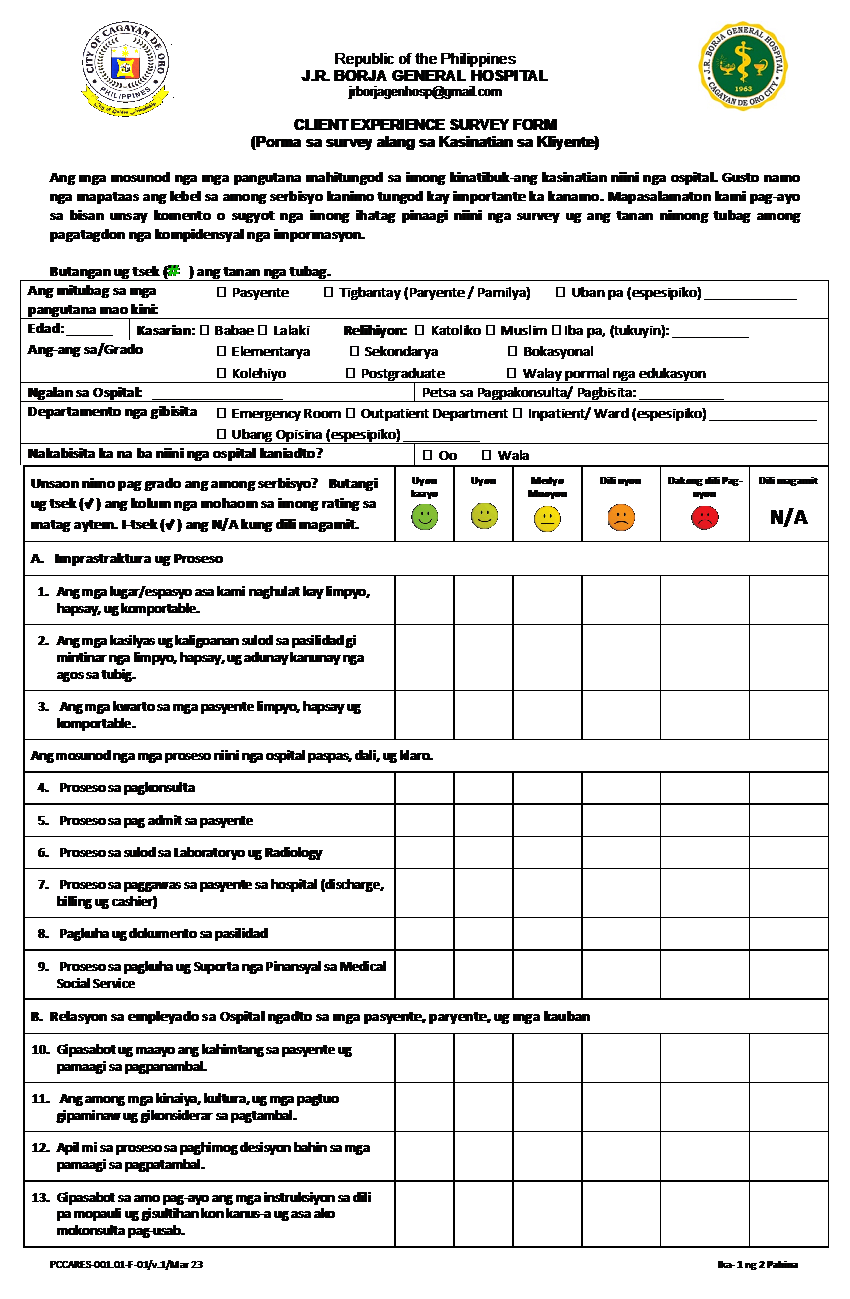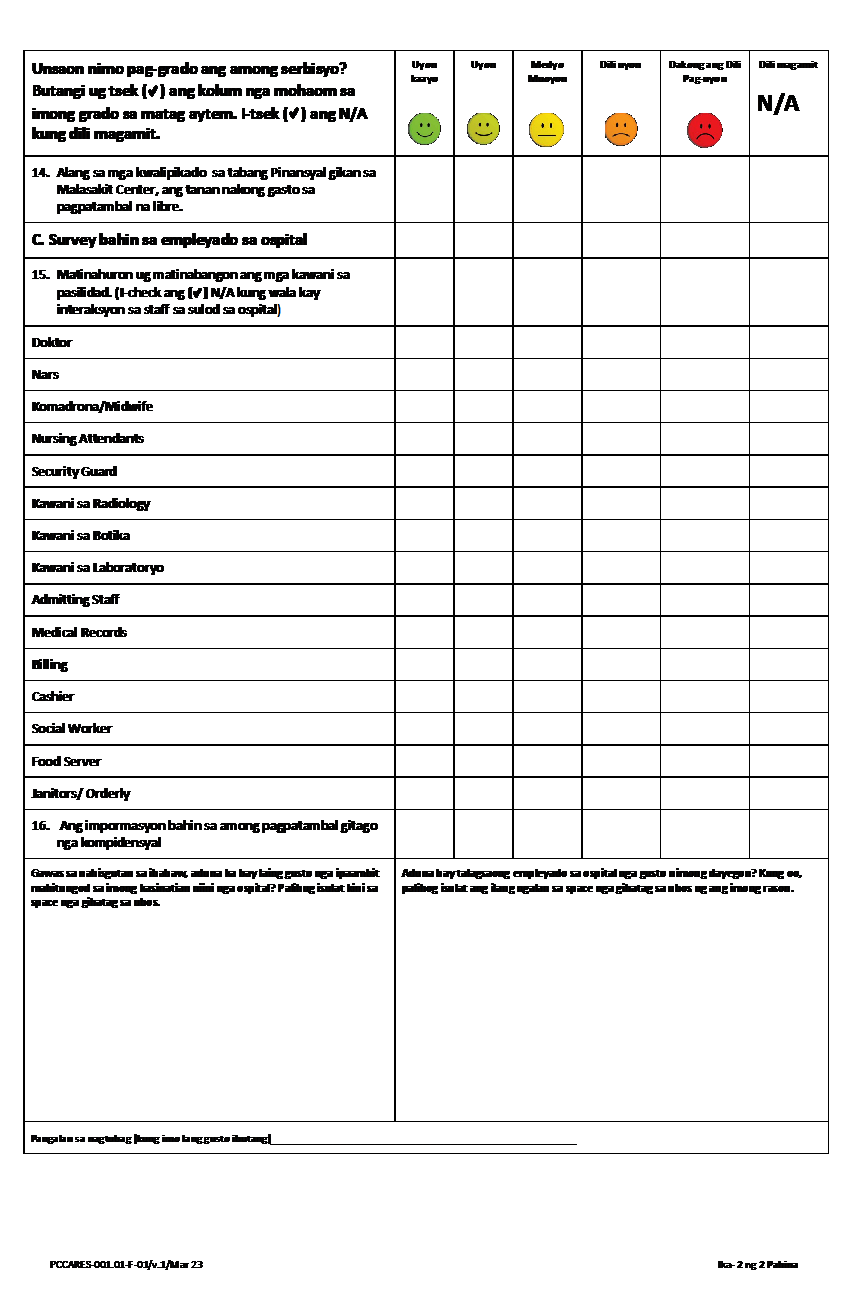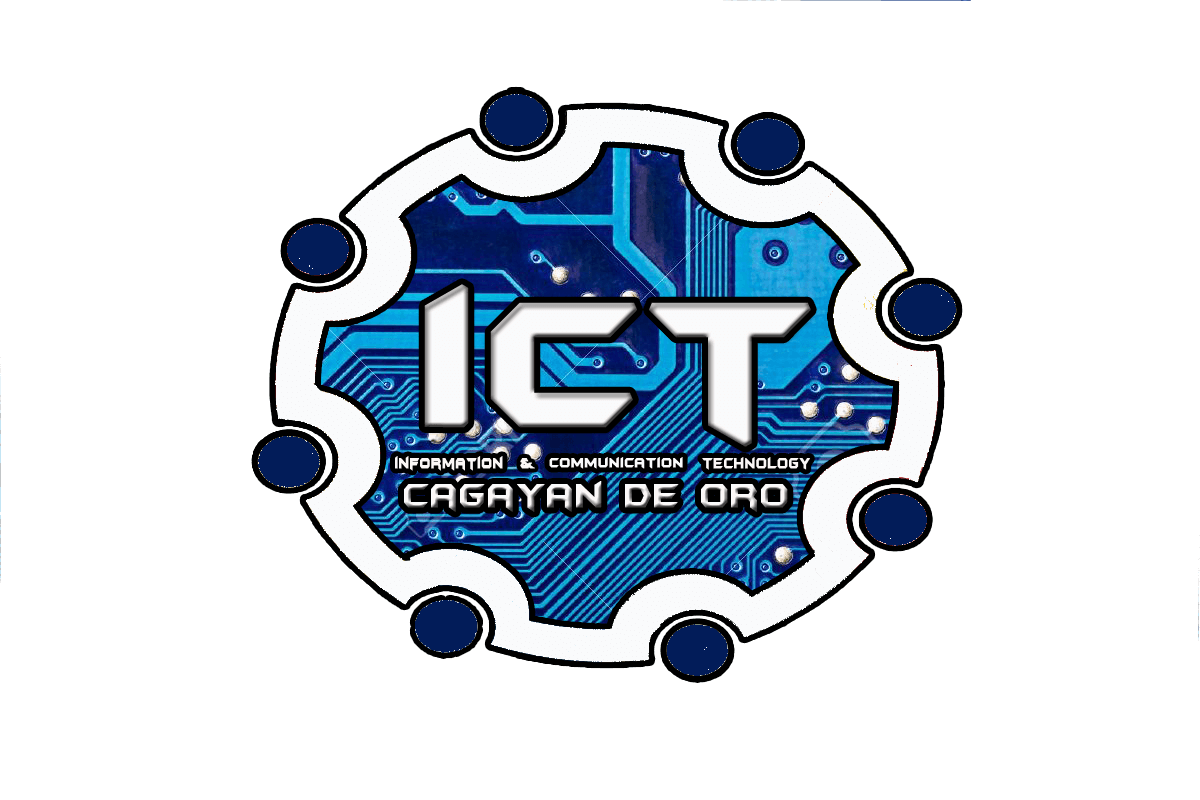Medical Social Services Department (MSSD) Staff
| Delia B.Cuerquis, RSW - Social Welfare Officer III | 09173035680/09777522402 |
| Nestor P. Suson Jr., RSW - Social Welfare Officer II | 09151164250 |
| Cristina L. Pinatalong, RSW - Social Welfare Officer I | 09507877300 |
| Jenilyn P. Pinatalong, RSW - Social Welfare Officer I | 09057906233 |
| Rizajean Nika P. Maestrado, RSW - Social Welfare Officer I (J.O.) | 09979772005 |
| Sharmaine A. Badal, RSW - Social Welfare Officer I (J.O.) | 09274919218 |
| Gladys Mae S. Tayong, RSW - Social Welfare Officer I (J.O.) | 09661728122 |
| April Cindy C. Flores, RSW - Social Welfare Officer I (J.O.) | 09995164632 |
| Larkin V. Valmorida, RSW - Social Welfare Officer I (J.O.) | 09658305490 |
| Mielannie Christine O. Capinpuyan- Social Welfare Assistant (J.O.) | 09058562897 |
MEDICAL SOCIAL SERVICE
Vision
The Medical Social Services Department shall be an integral part of J. R. Borja General Hospital by accomplishing social welfare programs and services on a 24/7 basis through humane, committed, and capable personnel and by using fully automated systems.
Mission
The JRBGH Medical Social Services Department shall provide social services and programs to disadvantaged patients and assist patients in handling their medical, social, mental, and spiritual needs.
Goals
- The MSSD shall operate in accordance with the Code of Ethics and Values of Social Work practice.
- The MSSD shall advocate for the needs and interests of the client in health care, including advocating for change to improve access to care and delivery of services.
- The MSSD shall safeguard the privacy and confidentiality of client information. The office shall be appropriately located and integrated with the other units and department/services of the hospital to facilitate ongoing consultation, collaboration, and coordination to meet the needs of the patients.
- The MSSD shall classify patients as mandated by RA 747 s. 1952, An Act to Regulate Fees in Government Hospitals and Charity Clinics and its current rules and regulations and AO 51-A s. 2001, Implementing Guidelines on Classification of Patients and on Availment of Medical Social Service in Government Hospitals. The assessment and evaluation program shall be continual, comprehensive, and shall be utilized in developing interventions and treatment strategies.
- The MSSD shall provide Social Work Case Management Services that optimize client functioning. Case Management facilitates collaboration among providers to address the client’s biomedical and psychosocial needs to provide efficient, appropriate, and beneficial health care service with multiple needs.
- The MSSD shall practice through healthcare teams and collaborate with other professionals, volunteers, and groups in and outside of the health facility to enhance all aspects of the patient’s and family system’s health care.
- The MSSD shall maintain records and documentation of social work services that reflect; (1) the client and the client system’s pertinent information for assessments and treatment, and (2) social work involvement and outcomes with and for clients. These are all in accordance with health care goals and legislative and administrative regulations and policies.
- The MSSD shall provide opportunities for its personnel to update their knowledge in health care settings and current theory and practice, and to integrate such information into its programs and services.
- The MSSD shall implement a Continuing Quality Improvement Program.
- The MSSD shall have access to computer technology and the internet, as the need to communicate electronically and gather information from the web for purposes of education, networking, and resources are essential for efficient and productive practice.
- The MSSD shall maintain a workload that allows for efficient and quality medical social work service delivery. The size of the medical social work staff represents the scope and the complexity of the organization and the nature and numbers of the population served.
- The MSSD shall be well-organized and properly directed and staffed with qualified social workers and personnel who perform specific functions. Medical Social Workers shall be registered as provided in RA No.4373 of the Professional Regulatory Board for Social Work, and as required by the Civil Service Law in RA No. 1080. They shall also be duly certified by the DOH League of Medical Social Workers, Incorporated (DOHLMSWI) as Association of Medical Social Workers of the Philippines, Incorporated (AMSWPI).
- The MSSD shall be headed by a licensed and eligible Medical Social Worker who is capable of supervising the Medical Social Worker staff in their responsibilities in practice, research, policy, orientation, and education.
Services
8Social Work Case Management Services that optimize client functioning
Psychosocial assessment
- Risk assessment
- Developing the social profile
Psychosocial interventions
- Psychosocial casework
- Crisis intervention
- Trauma informed care
- Protective services
- Ward visitations
- Information and referral
- Hospice and palliative care
- Placement of abandoned patients
- Home visitation (if no available LGU social worker) and home conduction
- Referrals of abandoned, unclaimed, and unidentified cadavers
Social Work counseling
- Marriage counseling
- Spiritual counseling
Managed care (health insurance plan) to ensure delivery of quality and efficient
patient care
- Pre-admission planning (medicolegal cases)
- Discharge planning
- Eligibility assessment
- Point of service enrollment
- Resource mobilization
- Utilization review
- Donations management program (in coordination with the Materials Management Section)
Clientele
Vulnerable populations
These are defined as those at greater risk for poor health status and healthcare access, and those who experience significant disparities in life expectancy and increased morbidity, and mortality.
The following are considered vulnerable populations:
- Economically disadvantaged
- Racial and ethnic minorities
- Uninsured
- children in low-income households
- Elderly
- Homeless
- HIV patients
- Patients with chronic health conditions including severe mental illness
Populations in special circumstances
Special circumstances are those which are medical or health-related, personal or familial, employment or work-related, or any situational crises that involve an unexpected event that is usually beyond the individual's control.
These include:
- Victims of natural and man-made disasters
- Loss of a job
- Sudden death of a loved one
- Victims of abuse and neglect
- Other crisis situations
At-risk populations
These are people with functional needs that may interfere with their ability to access or receive medical care before, during, or after a disaster or emergency.
These include people who are/have:
- Physically or mentally disabled (blind, deaf or hard of
hearing, with learning disabilities, mental illness, or mobility limitations) - Limited language skills
- Geographically or culturally isolated
- Homeless
- Senior citizens
- Children
Financially incapacitated and incapable patients. Patients who demonstrate clear inability to pay or spend for necessary expenditures for medical treatment. These include patients with catastrophic illnesses or any illness which is life or limb-threatening and requires prolonged hospitalization, and extremely expensive therapies of other special but essential care that would deplete one's financial resources.
APPENDIX A
Organogram
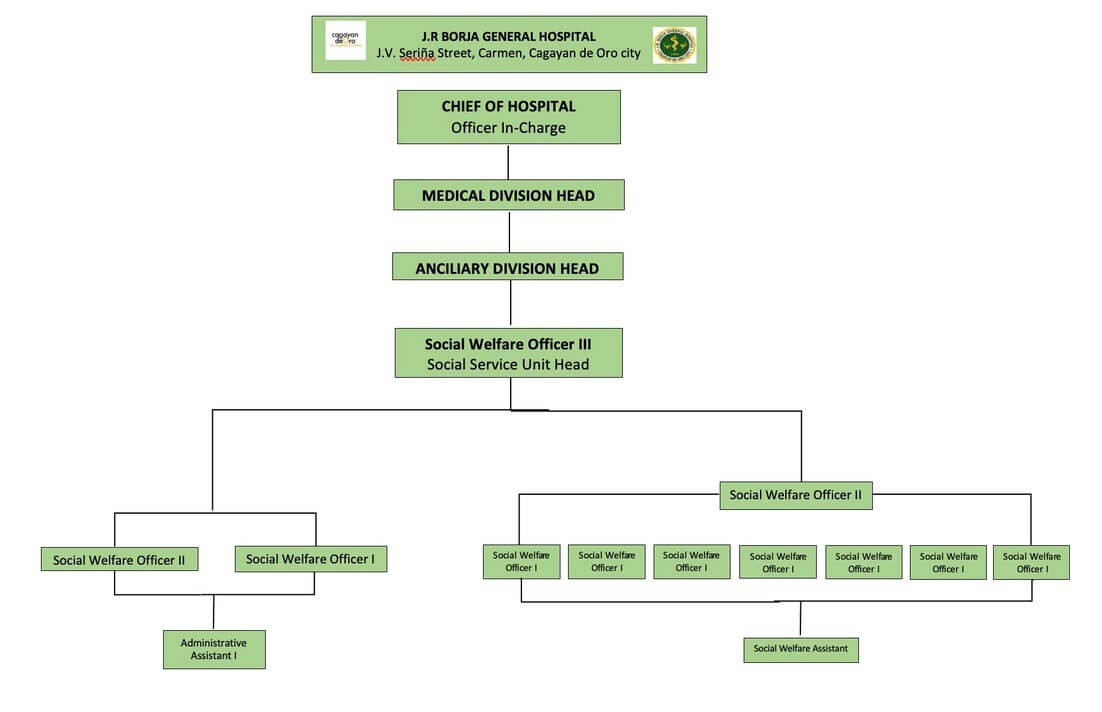
APPENDIX B
Duty Schedules and Work Hours
|
TIME |
MON |
TUE |
WED |
THUR |
FRI |
SAT |
SUN |
|
8:00-4:00 |
SWO III |
SWO II |
SWO III |
SWO III |
SWO III |
|
|
|
8:00-4:00 |
SWO II |
SWO II |
SWO II |
SWO II |
SWO II |
|
|
|
8:00-4:00 |
SWO I (A) |
SWO I (A) |
SWO I (A) |
SWO I (A) |
SWO I (A) |
|
|
|
8:00-4:00 |
SWO I (B) |
SWO I (B) |
|
SWO I (B) |
SWO I (B) |
|
SWO I (B) |
|
8:00-4:00 |
SWO I (C) |
SWO I (C) |
SWO I (C) |
|
SWO I (C) |
SWO I (C) |
|
|
8:00-4:00 |
SWO I (D) |
|
SWO I (D) |
SWO I (D) |
SWO I (D) |
|
SWO I (D) |
|
8:00-4:00 |
SWO I (E) |
SWO I (E) |
SWO I (E) |
|
SWO I (E) |
SWO I (E) |
|
|
8:00-4:00 |
SWO I (F) |
SWO I (F) |
SWO I (F) |
|
SWO I (F) |
|
SWO I (F) |
|
8:00-4:00 |
SWO I (G) |
SWO I (G) |
|
SWO I (G) |
SWO I (G) |
SWO I (G) |
|
|
8:00-4:00 |
SWA (A) |
SWA (A) |
SWA (A) |
SWA (A) |
SWA (A) |
|
|
|
8:00-4:00 |
SWA (B) |
SWA (B) |
SWA (B) |
SWA (B) |
SWA (B) |
|
|
Legend:
Social Welfare Officer III (SWO III) = 1
Social Welfare Officer II (SWO II) = 1
Social Welfare Officer I (SWO I) = 7
Social Welfare Assistant (SWA) = 1
Total Number of Staff = 10
List of Forms Used by MSSD
- Form no. 1 - Assessment Tool – is the standard form used to gather data needed to assess patients ages 18 and below, on their psychosocial development, medical condition and treatment, physical, mental, and emotional health, along with their perception of themselves, family's psychosocial functioning, determinants of health, health risk behaviors and common age-related health issues. This includes their family's financial capacity to support and maintain their health. It is the basis of the patient's eligibility and MSSU Intervention.
- Form no. 2 – General Intake Sheet - refers to a comprehensive document or form used to gather essential information about individuals seeking assistance or services. It serves as an initial point of contact and an important tool for assessing the needs, strengths, and challenges of clients.

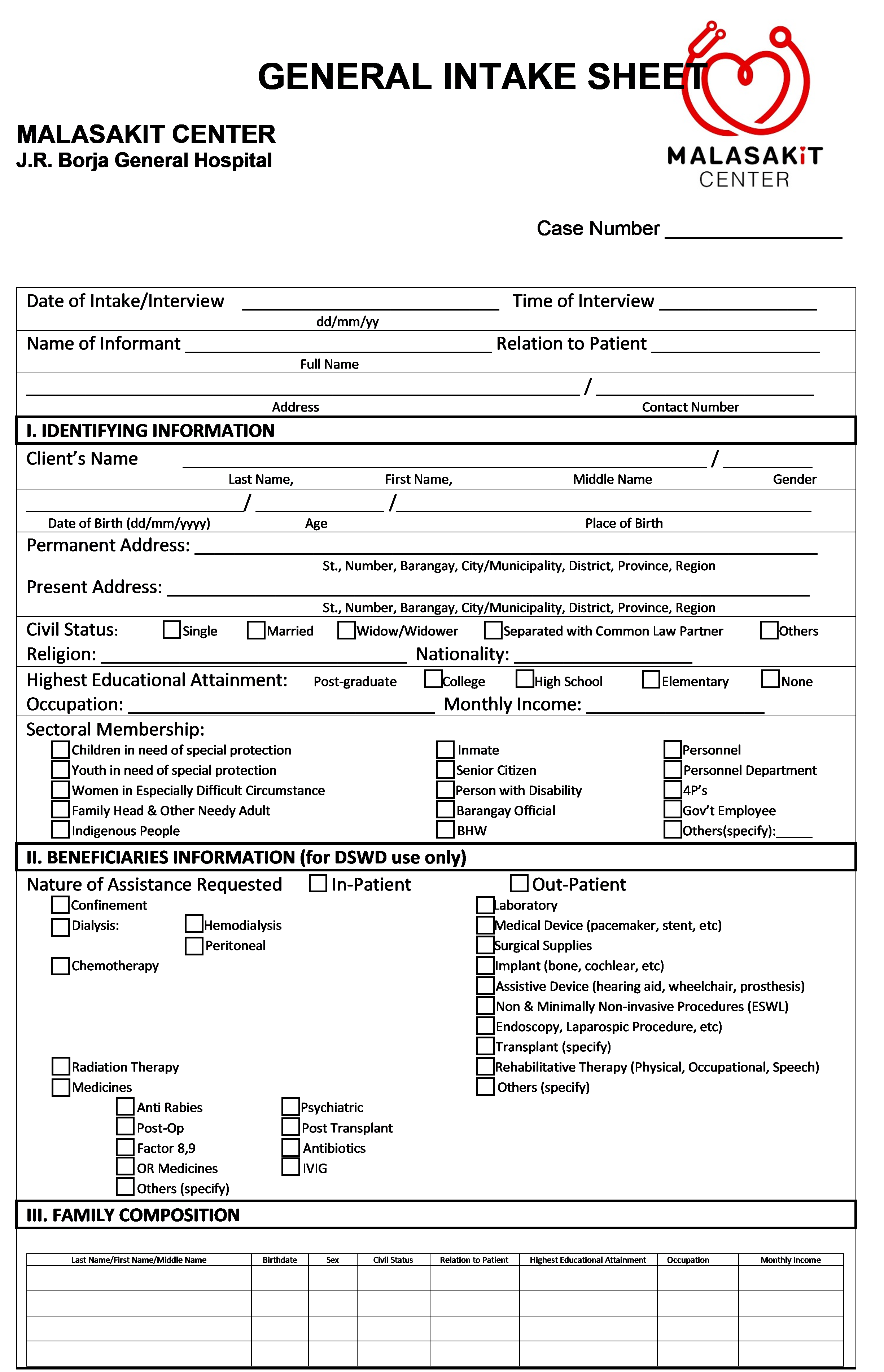

- Form no. 3 – Certificate of Indigency - form utilized to certify indigency for purposes of referral
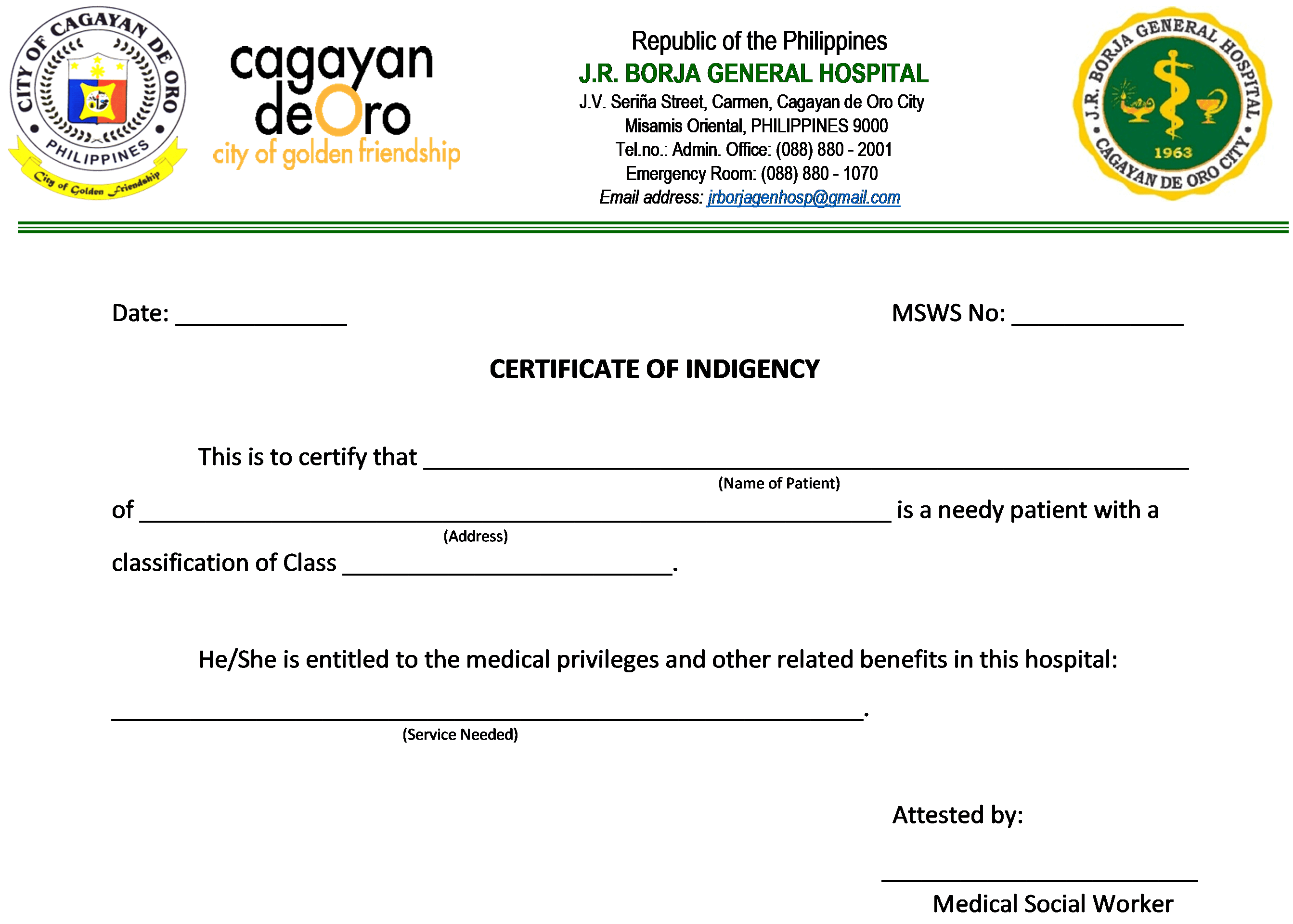
- Form no. 4 – MSSU Card - a concise summary document used by medical social workers in healthcare settings. It provides important information about a patient for an easy retrieval of records upon return
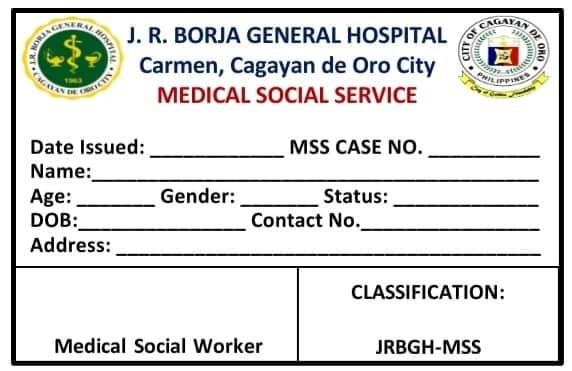
- Form no. 5 – Validation Sheet – used to carefully review and validate the information provided by the patient. This may involve cross-referencing the data with supporting documents, conducting interviews or assessments, and verifying eligibility criteria established by the assistance program.

- Form no. 6 – Certificate of Financial Eligibility - serves as proof that an individual meets the predetermined requirements to receive financial support and/or government assistance programs.
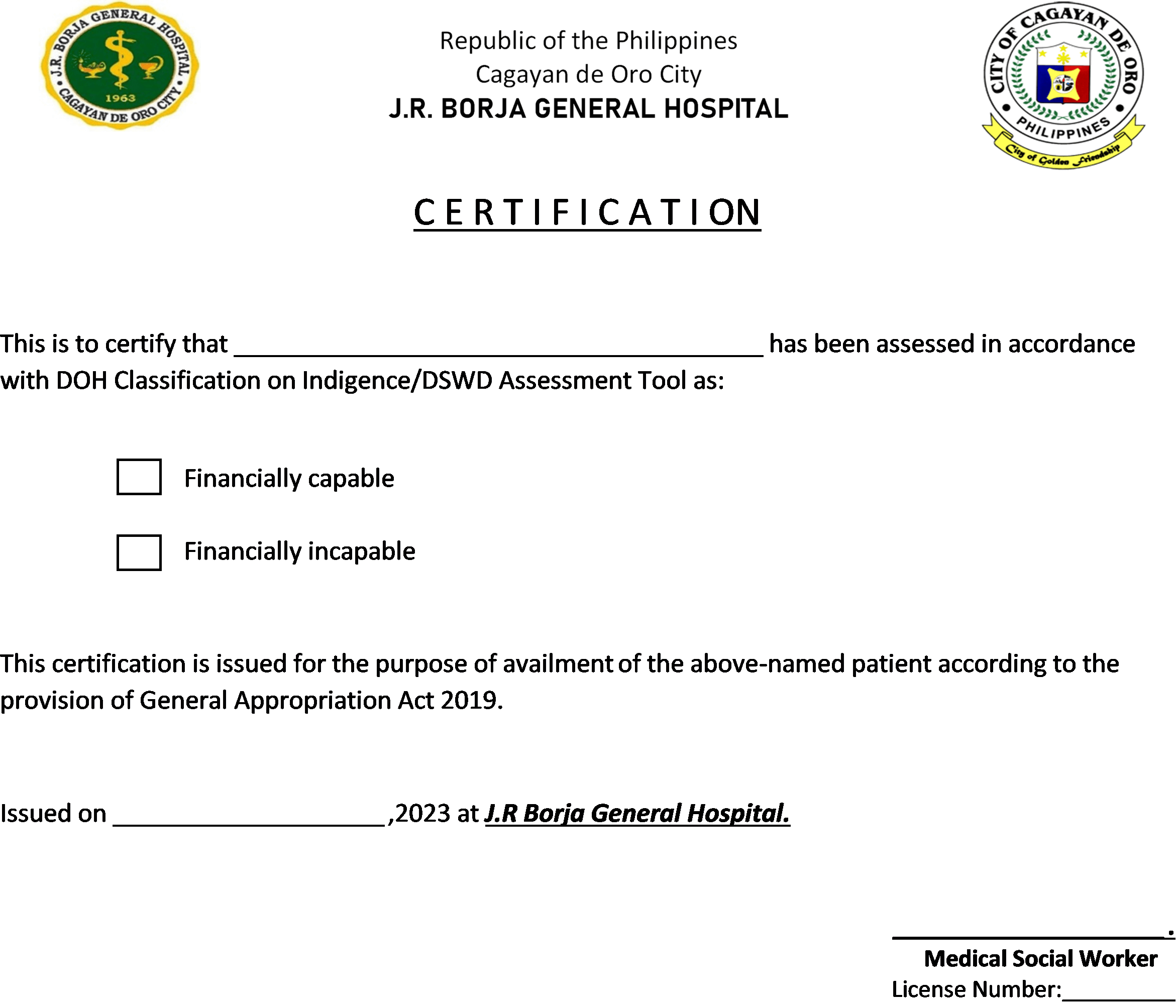
- Form no. 7 – Unified Intake Sheet – Prescribed standard form to be used by all participating agencies to profile the socioeconomic status and other related personal information of the patient/client.
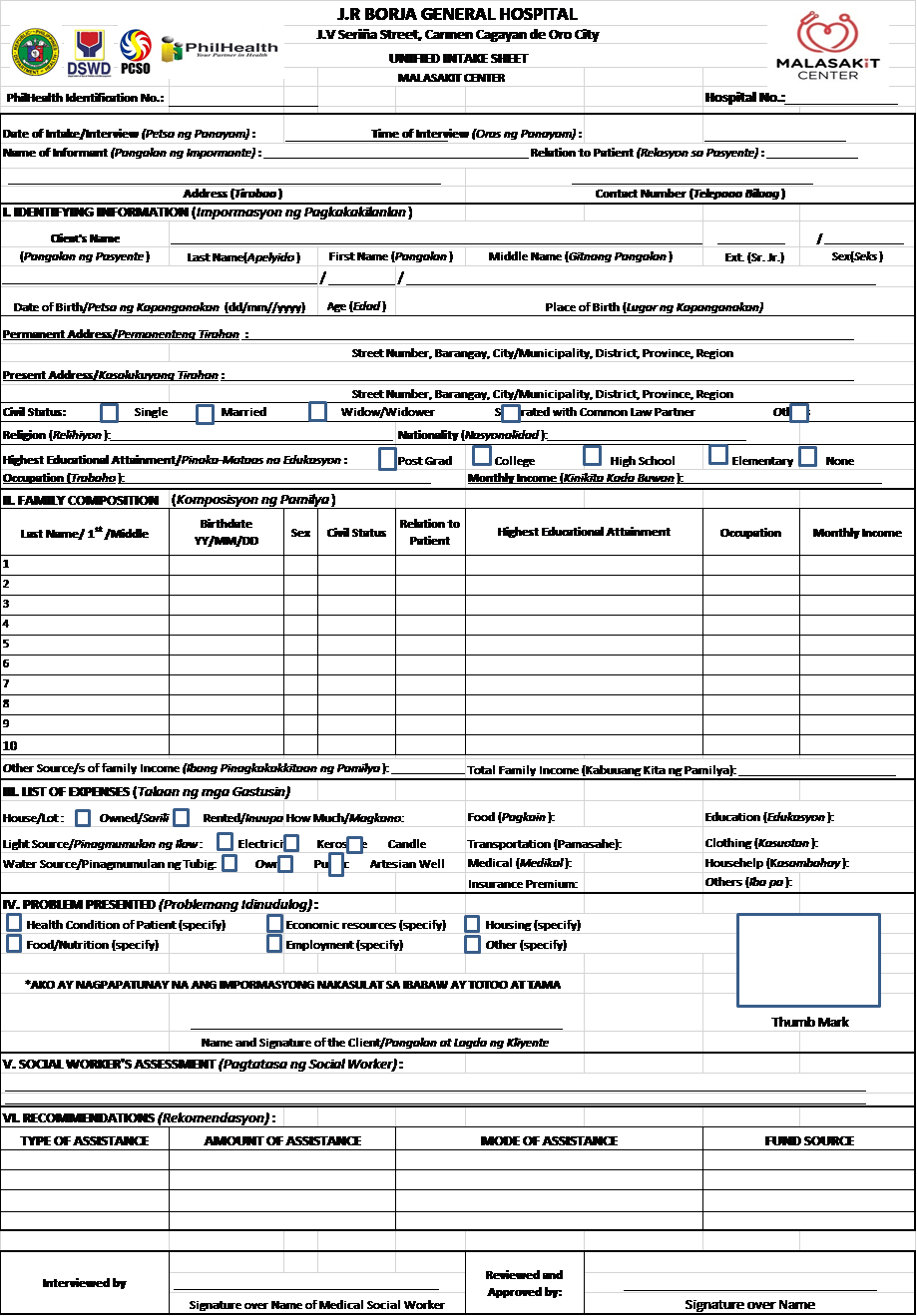
- Form no. 8 –Client’s Feedback Form - The feedback form provides clients with an opportunity to express their satisfaction or dissatisfaction with the services they have received. Clients can provide detailed feedback about the efficiency, effectiveness, and quality of the assistance provided by PCSO. They can also offer suggestions for improvement or highlight any issues they encountered during the process.

APPENDIX D
STATISTICAL REPORTS
- Form no. 9 - Statistical Report to Hospital Statistician - contains the MSSU accomplishment in Figures. It provides information on the status of compliance of the department with standard services. This report, when consolidated with other reports from other program of assistance services, shall serve as a data bank that shall be utilized for benchmarking and review of policies. It is required monthly at the hospital level.
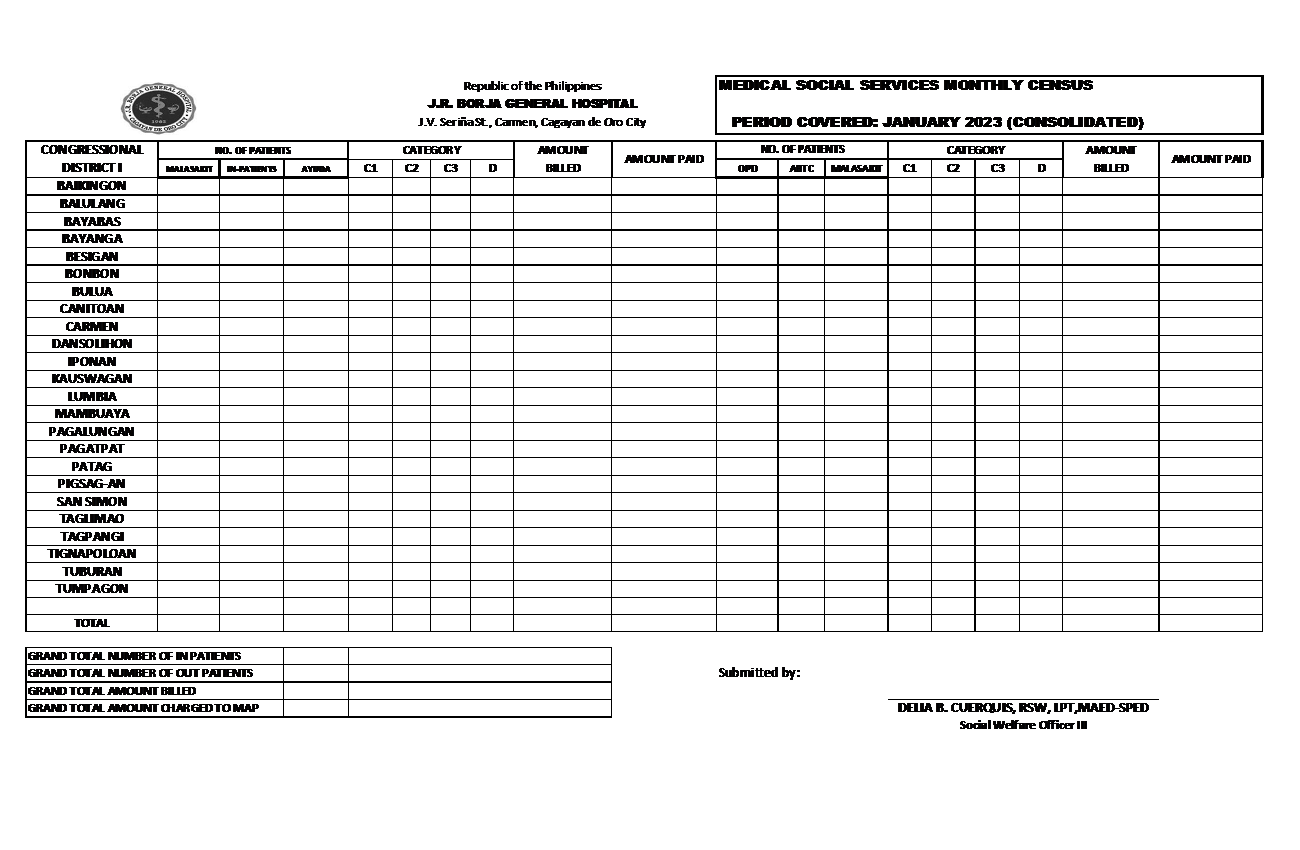
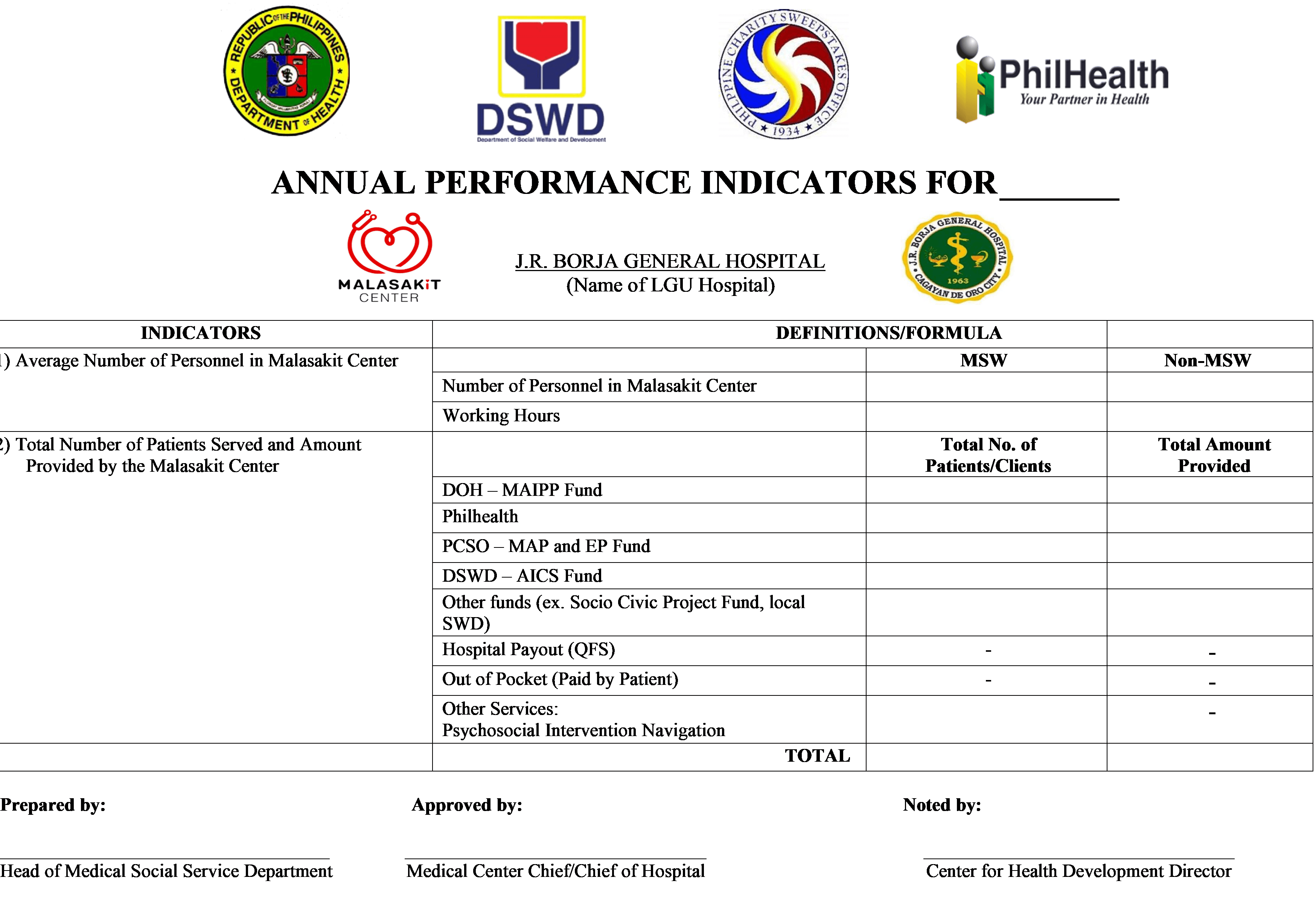
Retention Period for MSSD Documents
|
Records Series Title and Disposition |
Retention Period |
Disposition Authority/Remark |
||
|
Active |
Storage |
Total |
||
|
Accomplishment Reports |
|
|
|
|
|
Annual |
15 years |
|
||
|
Monthly |
1 year |
|
1 year |
After incorporated in the Annual Report |
|
Quarterly |
|
|
|
After incorporated in the Annual Report |
|
Case Studies |
Permanent |
|
||
|
Adaptation and placement of |
|
|
|
Permanent |
|
Indigency certificates |
1 year |
|
1 year |
|
|
Assessment tool |
1 year |
|
1 year |
|
|
Invitations |
1 year |
|
1 year |
|
|
Letters of intent (Congressional Trust Fund) Case File |
1 year |
|
1 year |
|
|
Pauper's burial permit with death certificate case file |
Permanent |
|
||
|
Record Books |
|
|
|
|
|
General Registry |
|
|
|
Permanent |
|
Receiving |
1 year |
|
|
|
|
Women and Child Protection Unit |
|
|
|
Permanent |
|
Referrals/Communications to other agencies outgoing |
2 years |
|
2 years |
|
|
Schedules |
1 year |
|
1 year |
|
|
Duty and Off Duty |
|
|
|
|
|
OPD Lectures/Modules |
1 year |
|
|
|
